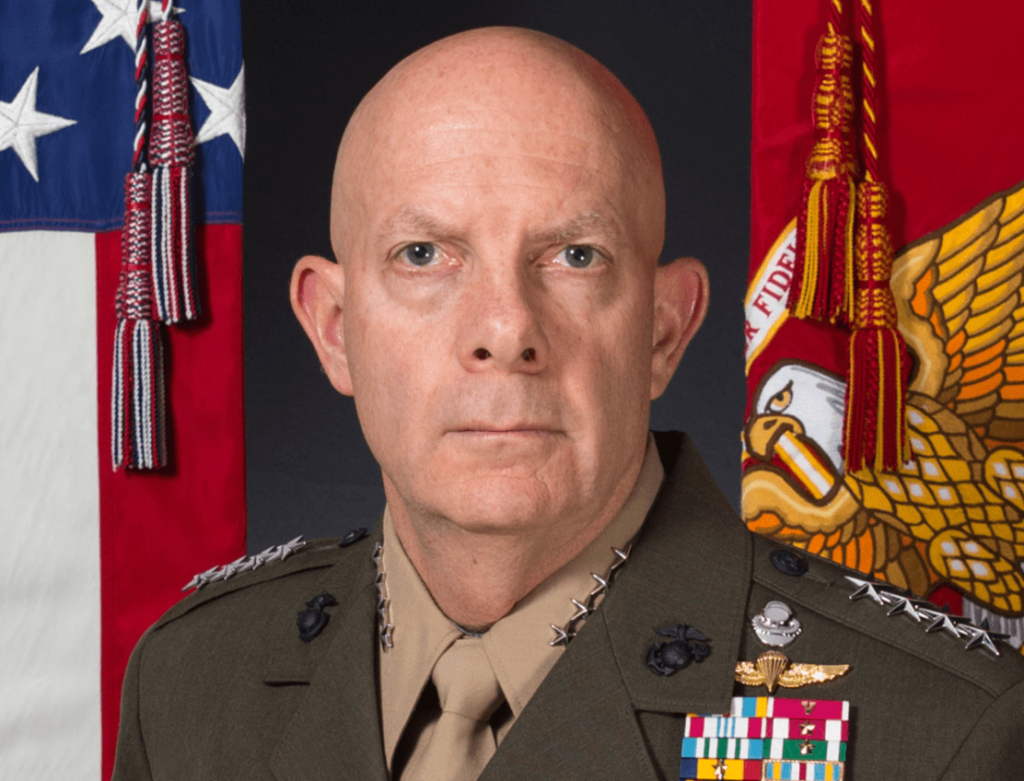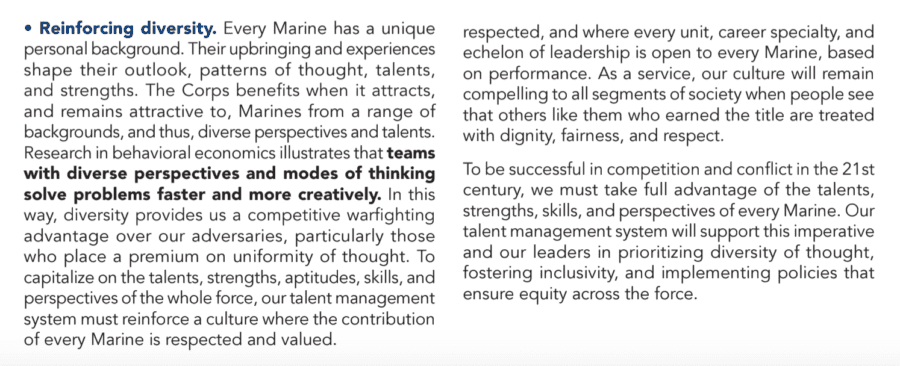Annals Of Gaslighting: Armed Forces Edition

The Marine Corps, the smallest U.S. military force, has plans for a big overhaul designed to address its lack of diversity and problem with retaining troops.
The goal that’s driving what amounts to a cultural shift within the service, is for the Marines “to reflect America, to reflect the society we come from,” Gen. David Berger, commandant of the Marine Corps, said in an interview with NPR’s Morning Edition.
It’s not a matter of being politically correct or “woke,” he said.
The core of America’s strength lies in its diversity, Berger said, adding that the same is true for the military.
“Our advantage militarily is on top of our shoulders,” he said. “It’s not actually our equipment. We are better than anybody else, primarily because we don’t all think exactly alike. We didn’t come from the same backgrounds.”
No, it’s not wokeness. It’s not! Stop saying it is, bigot! Diversity is our STRENGTH™!
Read or listen to it all. Do I even need to tell you that there is zero pushback from the NPR reporter? The purpose of this report was to reassure listeners that all is well with the Marine Corps, as it implements the same ideology that has conquered the leadership ranks of every other major institution in this country.
I wrote recently in this space about this same USMC plan (see “The Baizuocracy At War”). Do you think that listening to or reading that NPR report, the American people would grasp what’s really going on here? Do you think this official Marine Corps graphic celebrating the new approach occurs to Americans?

Here, from the USMC’s document (the one the commandant was on NPR defending), is the Corps’ new attitude:

The military, like every other bureaucracy that drinks the Kool-Aid, tells itself this lie. The truth is — this, based on my experience in the intentionally diverse workplace — is that hiring for any reason other than capability and competency ends up creating resentment and demoralization on the team. Once people understand that N. was a diversity hire, when N. fails to do the work, dumping it off on others, resentment builds. What makes it worse is the certain knowledge that to complain about it to one’s superiors would be to risk one’s job as a self-outed “bigot”.
The reader who first tipped me off to this said:
My comment is that the priority should be to put together a skilled, cohesive and highly trained military force that can be exceedingly lethal when necessary. The line that diversity provides us a competitive warfighting advantage over our adversaries is entirely absurd.
The beauty of the military I grew up in was the oneness of the soldiers, airmen and sailors and singular commitment to the mission whatever that may be. When that uniform went on, there was no differences or diversity. In times of battle, the cohesion and commitment to each soldier to his brother is what gets them through.
I recently met an active duty member of the armed forces who told me that the leadership of our military seems to be more interested in winning the culture war against unwoke soldiers, sailors, and airmen than in winning actual wars against America’s enemies.
My old TAC colleague Kelly Beaucar Vlahos, who covers military affairs, has a great piece today at The Spectator, talking about how hard questions have arisen about the condition of the military. She begins by talking about how USMC Lt. Col Stuart Scheller put his entire career on the line to speak out against corruption in the leadership ranks, in light of the Afghanistan debacle. More:
Scheller was relieved of his command, jailed briefly, and court-martialed, but a largely sympathetic military judge gave him a reprimand and $5,000 fine (much to the consternation of the prosecution). While the military community was split over his punishment for violating code, there was clearly something more powerful going on. Scheller’s decision to put his career on the line to demand accountability became a mantra, not just about the August evacuation — but a reckoning of the last two decades.
(Ret.) Col. Doug Macgregor, writing in the American Conservative in October:
The generals always knew that the public admission of failure would not simply throw 20 years of graft and deceit into sharp relief; such an admission would expose the four stars themselves to serious scrutiny. To explain the rapid collapse of the U.S.-backed Afghan state and the inexcusable waste of American blood and treasure, the American people would discover the long process of moral and professional decline in the senior ranks of the Army and the Marines, their outdated doctrine, thinking, and organization for combat. For the generals it was always better to preserve the façade in Kabul, propping up the illusion of strength, than face the truth.
It was as if the Afghanistan debacle had finally ripped the last scab off the military’s role in the failed enterprise. Suddenly the superstar warrior/monk generals for whom the mainstream media had written endless paeans, before which members of Congress had bowed and scraped, were under the garish light of delayed circumspection.
As a result, there is plenty of talk about what went wrong and what shape the military is in for the future. And certainly just focusing on “the generals” would be shortsighted. This is about the institution — for which America’s trust is actually plummeting. So can the military really afford not to take stock of the cultural, institutional — and yes, political — changes that have swept over it in the last 20 years or more?
“My major concern is military effectiveness,” says (Ret.) Marine Corps. Capt. Dan Grazier, who served tours in Iraq and Afghanistan in a tank battalion and is now a military analyst at the Project on Government Oversight, “that in the rare event where the military does need to be deployed that we can be the most effective, lethal force possible when the situation calls for it.”
After interviews with several infantry veterans who served in the post-9/11 wars, The American Spectator picked up on a familiar theme as the main obstacle for rebuilding the forces and the faith: leadership corrupted by careerism and influenced by outside interests that don’t always coincide with the interests of the national defense.
The Vlahos article does not focus on wokeness, note well. But there’s a definite tie-in. Look:
(Ret.) Army Lt. Col. Daniel Davis, who also served multiple tours in Iraq and Afghanistan, blames the influence of private industry, particularly its cozy relationships inside the Pentagon for the dysfunctional nature of procurement and acquisitions. Private defense firms spent $1 billion lobbying Washington since 2001, and in return received some $7 trillion in taxpayer funds over the course of the post-9/11 wars — that’s half of the $14 trillion spent overall.
Davis says this amount of money sloshing around has created enormous boondoggles that leave the forces ultimately high and dry (and the contractors fat and happy). Chew on this: the Air Force now wants to cut more than 87,000 pilot training hours because aircraft sustainment costs soared to $1 billion this year.
All these top generals who have gone ga-ga over Diversity, Equity, and Inclusion, are making themselves more attractive to corporate culture, including defense contractor culture, by demonstrating their loyalty to the successor ideology. More:
Davis and Grazier say the problem is too much money and industry influence going on the E-Ring to get at it. Thus the revolving door: one POGO report from 2008 to 2018 found that 280 high ranking officials became lobbyists, board members, executives, or consultants for defense contractors within two years of leaving the service. Military officers going through the revolving door included 25 generals, 9 admirals, 43 lieutenant generals, and 23 vice admirals.
And then they come back. Secretary of Defense Mark Esper was a Raytheon lobbyist ($27 billion in federal contracts in 2020); Secretary of Defense Patrick Shanahan came from Boeing ($21 billion), Secretary of the Army Ryan McCarthy bounced over from Lockheed ($74 billion), and current Secretary of Defense Austin was a paid member of the Raytheon board after leaving the service in 2016.
Though the awokening of our armed forces began under Obama, Esper, a Trump appointee (!), was a major force pushing the awokening of our armed forces. Two years ago, I talked to a Raytheon management employee, a veteran and a conservative Christian who told me he was on the verge of quitting because he could not accept the compulsion to celebrate LGBT Pride that was now expected of Raytheon managers. Note well: he wasn’t talking about tolerance, but about being forced to affirm Pride as a condition of his job as a manager in this defense contracting giant. The revolving door brings the infection of wokeness from corporate board rooms to the Pentagon.
Now do you understand better why NPR’s story is gaslighting? The media already have accepted the successor ideology as dogmatically true. It wouldn’t even occur to many of these reporters that there is another side to this issue, or a down side.
This is tangential, but I think it applies. I wrote over the weekend about how NPR gaslit its audience on the controversial book “Gender Queer” by Maia Kobabe. The book is being removed from school library shelves here and there, after parents complain that its pornographic content is inappropriate. In my post, I observed that NPR (on the web version of its story) only showed the most innocuous pages from the graphic memoir, and did not show the parts that have parents up in arms. If you depended on NPR to tell you about this controversy, you would think that this is clearly nothing more than right-wing bigoted parents up in arms over nothing. I posted on that blog post images from the book that have upset parents. You might think that parents are overreacting, but you should at least understand what they’re actually reacting to; the dishonest sleight of hand from NPR’s 1A program is misleading.
Interestingly, a prominent Yale professor — a man who is a liberal of real courage, who stood up to a woke campus mob in 2015 — had this to say about it on Twitter this morning:
Here is a tweet with images deemed most offensive. My sense is that having such a book available in a high school library is in keeping with the sexual awareness of most students that age. And similar content should be available for straight students, too. https://t.co/Nlne4Y4rXB
— Nicholas A. Christakis (@NAChristakis) November 15, 2021
Read the comments — Prof. Christakis is being roasted by his followers. My guess is that his thinking this stuff is fine for teenagers (versus the very, very strong pushback he’s getting from his Twitter followers) is a reflection of how cut off from ordinary people American elites — especially academic elites — are. It simply doesn’t occur to them that people would find a graphic memoir depicting minors performing fellatio as part of a journey to discovering that the protagonist is “gender queer” as outrageously inappropriate for a school library. Look, I respect Christakis, who was brave when it counted, but I think his reaction is quite telling. And I think it has a lot to do with why our media are so untrustworthy, and why the successor ideology having conquered the senior officer class in the US military makes our country weaker. It’s all based on ideological lies.
It is long past time for Republican members of Congress to cease and desist their knee-jerk deference to the military, and to push back on this corruption — the ideological corruption, as well as the revolving door between the Pentagon and defense contractors. We haven’t been able to win a war in a long time. Just you wait until we get into a major one. Is it going to take a catastrophe like that to finally force reform? Note well that the Russian Imperial army’s loss in the Russo-Japanese War was a major factor in undermining the Russian people’s confidence in the Tsarist government, which was overthrown in 1917. This stuff matters.
UPDATE: This news just in:
The U.S. Air Force can’t provide its pilots with additional flight hours in part because aircraft sustainment costs have surged to roughly $1 billion, top service leaders told lawmakers Tuesday.
While flying hours do not directly equate to how experienced or proficient a pilot is, there have been concerns about declining cockpit time for years, as this is crucial to maintaining aircraft skills.
According to its fiscal 2022 budget request, the service instead wants to slash flight time by roughly 87,500 hours. The planned reduction is due to the demands of weapon system sustainment, or WSS, which impacts aircraft availability, said Lt. Gen. David Nahom, deputy chief of staff for plans and programs.
The USAF veteran who sent the link comments:
This isn’t good. The amount of resources we allotted to flight training hours has given us our edge over competitors.
Well, clearly he’s wrong. Doesn’t he know that Diversity Is Our Strength™?
UPDATE: A reader writes:
25 years of service and anxiously awaiting retirement that I can’t achieve until I get my Covid shots. For those not in the military, it is worse than you wrote. Those are only the wave tops. It will get worse until large scale war happens, we get our asses kicked, and are forced to refocus to win.
Subscribe for as little as $5/mo to start commenting on Rod’s blog.